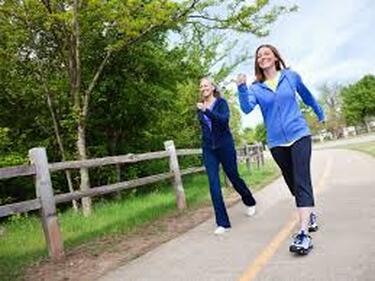|
Walking is a completely free and, in my opinion, underrated form of physical activity. Regardless of your age or fitness level it is something that everyone can do and benefit from and it has more benefits than you might think. Here are my top 8 reasons to get up and get walking today.
Increases your energy levels and improves mental health Walking, like any form of physical activity releases a range of “happy hormones” in our brain and body that not only make us feel good and energised but lower our pain levels too. During exercise the levels of our stress hormone also decrease, contributing to feeling more relaxed and energised for the rest of the day. Strengthens your bones Walking slows the rate of bone loss in the body specifically in the hips and legs and helps to increase bone density. This as a result delays and prevents the onset of conditions like osteoporosis and osteopenia as we age. Improves brain function As we age there is a natural decline in our cognition and grey matter in the brain. Physical activity and specifically walking has been shown to delay this decline and slow the onset of brain disorders such as Alzheimer’s and Dementia. Studies have shown that those who regularly engage in physical activity reduce their overall risk of developing these types of brain disorders by up to 40%. Fights Disease Regular exercise has been shown to decrease the likelihood of developing almost every chronic disease out there. This includes things like cancer, type 2 diabetes, cardiovascular disease, respiratory diseases and the list goes on and on. Some studies have found that people who engage in regular walks reduce their risk of developing diabetes by up to 60%. If you ask me that’s definitely worth a few extra steps to get those kind of benefits! Getting social I know during the current circumstances surrounding COVID-19 we are limited in how we can socialise but going for a walk with a friend or family member can be a great way to catch up while getting in your physical activity for the day. Instead of your usual cake and coffee catch up, next time ask your friend to join your for your stroll, or perhaps ring a friend while walking to help pass time a little quicker. Weight loss When starting out on a new fitness journey it can be overwhelming and a bit daunting in regard to where to start, what type of exercise to do and how to do it! Walking is a simple, cost effective and easy place to begin! It is a great form of aerobic exercise which assists in weight loss through increasing our caloric expenditure. The best part is it’s all self-paced, so if you want to work a bit harder, just increase your speed to help burn a few extra calories. Improves muscle and joint pain For our body to work at it’s best we need to keep it moving. This ensures that our muscles and bones stay strong helping to maintain healthy and pain free joints. Walking has been shown to reduce symptoms and pain associated with conditions such as arthritis and fibromyalgia. The low impact nature of walking is ideal to help improve function while also lowering pain in any affected joints or muscles. Reduces falls and trips If you are someone who frequently falls or has small trips, regular walking could help prevent these from happening, especially as we begin to age. Poor balance and weaker muscles in the legs and hips can cause us to shuffle when we walk increasing our risk of having a serious fall. Walking regularly improves balance and assists in strengthening our lower body to help prevent us from falling and suffering serious injuries as a result. Now that you know all the extra reasons a walk is so good for your health, why not grab a friend, or put on your favourite podcast and head out for a walk today! Aleisha Michael
0 Comments
Your comment will be posted after it is approved.
Leave a Reply. |
AuthorSLisa Parkinson Archives
July 2024
Categories
All
|


 RSS Feed
RSS Feed